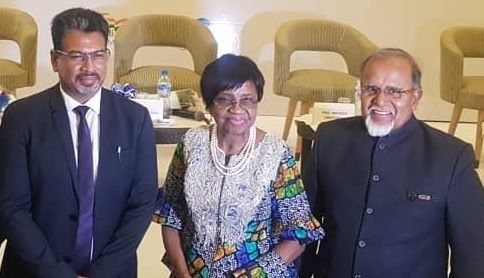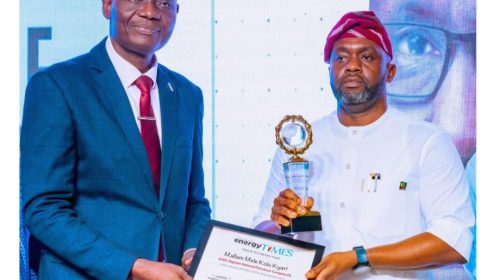NAFDAC CALLS FOR STRONGER SYNERGY BETWEEN INDIA-NIGERIA PHARMACEUTICAL SECTOR

By Ngozi Onyeakusi—The National Agency for Food and Drug Administration and Control, NAFDAC has called for a synergy between the Nigeria and India Pharmaceutical sector with a view to providing unhindered access to medicines that are safe, efficacious, affordable and of required quality.
The Director General, Prof Mojisola Adeyeye made the admonition at the India-Nigeria Pharmaceuticals and Health Industry forum organized in Lagos on Thursday, March 2, 2023, with the aim of providing concrete steps towards birthing, actualizing, and strengthening mutual benefits for pharmaceutical business in both countries.
She noted that the prognosis for the Pharma business in Nigeria and India, the population dynamics and associated health indices provide a common baseline for strong synergy between both countries.
Prof Adeyeye said it’s without any iota of hesitation to state that these indicators hitherto mentioned are reasons why the regulatory landscape between both countries must of necessity be explored for the good of their citizens.
In a statement by the Resident Media Consultant to NAFDAC, Sayo Akintola, in Lagos on Sunday, Prof. Adeyeye also noted strong correlation in economic indices in both countries which places them on the list of World Bank emerging markets thus creating objective evidence and the need for mutuality and strong bilateral cooperation.
She pointed out that no single country, no matter how endowed, can meet all of its national drug needs and yet the universal health coverage within the context of the sustainable development goals must be achieved, adding that one expedited mechanism for meeting essential drug need is through a proposition for mutually beneficial cooperation between regulatory agencies.
According to her, Nigeria was a huge beneficiary of this during the last global pandemic when a substantial quantity of COVID-19 vaccines was obtained from Serum Institute India, noting that this was typically made possible through the active intervening role of the India National Regulatory Authority NRA (The Central Drugs Standard Control Organization (CDSCO).
As a responsible National Regulatory Agency, Prof. Adeyeye, however, said that NAFDAC will continue to forge meaningful alliance within the confines of its mandate, relevant legislation and in line with global best practice.
As a ML3 Agency, she said that the Agency is strongly averse to unethical practices, noting that NAFDAC will not fail to protect public health through enforcement of appropriate sanctions when and where the need arises.
She warned that a situation where unscrupulous persons or manufacturers under the guise of convergence and cooperation, knowingly or unknowingly, engage in clandestine practices that violate extant regulations which constitutes significant risks to public health will not be treated with kid gloves.
NAFDAC’s mandate is to safeguard public health and we are not in any way about to give up on this obligation’’, she said, adding that some local and foreign manufacturers are currently sanctioned for unreputable practices and post marketing failures.
She pointed out that her transformative agenda in NAFDAC which include but not limited to attainment of WHO Maturity Level 4 status, attainment of vaccine lot release, supply chain monitoring and expanded post marketing surveillance, continual pharmacovigilance activities are enough justification for promotion of strong synergy between the India-Nigeria Pharma sector.
According to the NAFDAC boss, India is the largest trading partner of Nigeria and Nigeria is India’s largest trading partner in Africa with bilateral trade in the region of over 13.89 billion USD as of 2019. She added that Indian owned/operated companies are the second largest employer of labour in Nigeria with huge foreign direct investment in engineering, electrical machinery and equipment, plastics, chemicals, and the pharmaceutical sector.
To further enhance local production of pharmaceuticals and innovation in Nigeria, she reiterated that the Agency set up the Five Plus Five-Year Validity policy in 2019 for products that are sufficiently produced in the country. For such a product, during the registration license renewal period of 5 years, by the end of the 4th year of license validity, the importer/manufacturer is required to submit draft migration blueprints for local manufacturing or proposed partnership with a Nigerian company.
if there is no progress on migration to local manufacturing as detailed in the blueprint, an alert for de-registration will be sent to the company at the end of the 4th year in the five-year validity.
The Director General said the Five-Plus-Five Validity policy is working because many companies are now embracing this migration either through building quality focused facilities locally or partnership with existing local companies for their manufacturing needs.
Speaking in the same vein, the President of India Pharmaceutical Manufacturers and Importers of Nigeria (IPMIN), Mr. Verkay Verghese, pledged the association’s cooperation with NAFDAC to ensure that only wholesome medicines are produced in Nigeria or imported into the country to safeguard the health of Nigerians.
He commended NAFDAC for instilling professionalism in the Nigeria pharma sector, through what he described as pragmatic regulatory activity of the Agency under Prof. Adeyeye, stressing that with her at the helm of affairs, attaining WHO Maturity Level 4 would not be too difficult for NAFDAC.
SAYO AKINTOLA
Resident Media Consultant
NAFDAC …. CUSTOMER-FOCUSED; AGENCY MINDED






Leave a Reply